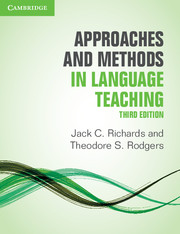Book contents
- Frontmatter
- Contents
- Acknowledgments
- Introduction to the third edition
- I Major trends in twentieth-century language teaching
- II Current approaches and methods
- III Alternative twentieth-century approaches and methods
- IV The teaching and learning environment
- Appendix: Comparison of approaches and methods
- Author index
- Subject index
8 - Competency-Based Language Teaching, standards, and the Common European Framework of Reference
Published online by Cambridge University Press: 08 April 2022
- Frontmatter
- Contents
- Acknowledgments
- Introduction to the third edition
- I Major trends in twentieth-century language teaching
- II Current approaches and methods
- III Alternative twentieth-century approaches and methods
- IV The teaching and learning environment
- Appendix: Comparison of approaches and methods
- Author index
- Subject index
Summary
Introduction
A common way of developing language courses is to first make decisions about what to teach, then to determine how to teach it, and finally to assess what was learned. With this process, what is learned is assumed to be the result of what is taught and how well it is taught. This approach to course planning is referred to as forward design in Chapter 21 of this book and often reflects the assumption that the learning outcomes of a course are dependent upon a well-designed syllabus and effective teaching methods. Consequently, we see throughout this book that discussion of the most appropriate form for a syllabus as well as the most appropriate teaching methods have been a recurring focus in language teaching for over a hundred years. However, there is another tradition in educational planning that appears to reverse the typical sequence of activities in which a course is developed. This approach begins with a description of learning outcomes, or what the learner should be able to do at the end of the course, and issues related to methodology and syllabus follow from the statements of learning outcomes. This approach is referred to as backward design, and has had a considerable impact on educational planning in general as well as in lan-guage teaching since the 1970s (Wiggins and McTighe 2006). It is discussed in more detail in Chapter 21. Leung (2012: 161–2) comments that “outcomes-based teaching in the past thirty years or so can be associated with the wider public policy environments in which the twin doctrines of corporatist management (whereas the activities in different segments of society are subordinated to the goals of the state) and public accountability (which requires professionals to justify their activiites in relation to declared public policy goals) have pre-dominated.” They represent attempts to set standards against which student performance and achievement can be judged and compared at any given stage of a teaching program. Leung further notes that the terms used to designate outcomes-based approaches include attainment targets, benchmarks, core skills, essential learnings/skills, outcomes-based edu-cation, performance profiles, and target competencies. Figueras similarly observes (2012: 479): “Curricula and language programmes today are often outcomes-based, drawn up with much more attention to real-life uses, and focused on what students will be able or should be able to do at the end of a course.”
Information
- Type
- Chapter
- Information
- Approaches and Methods in Language Teaching , pp. 150 - 173Publisher: Cambridge University PressPrint publication year: 2014
Accessibility standard: Unknown
Why this information is here
This section outlines the accessibility features of this content - including support for screen readers, full keyboard navigation and high-contrast display options. This may not be relevant for you.Accessibility Information
- 1
- Cited by
